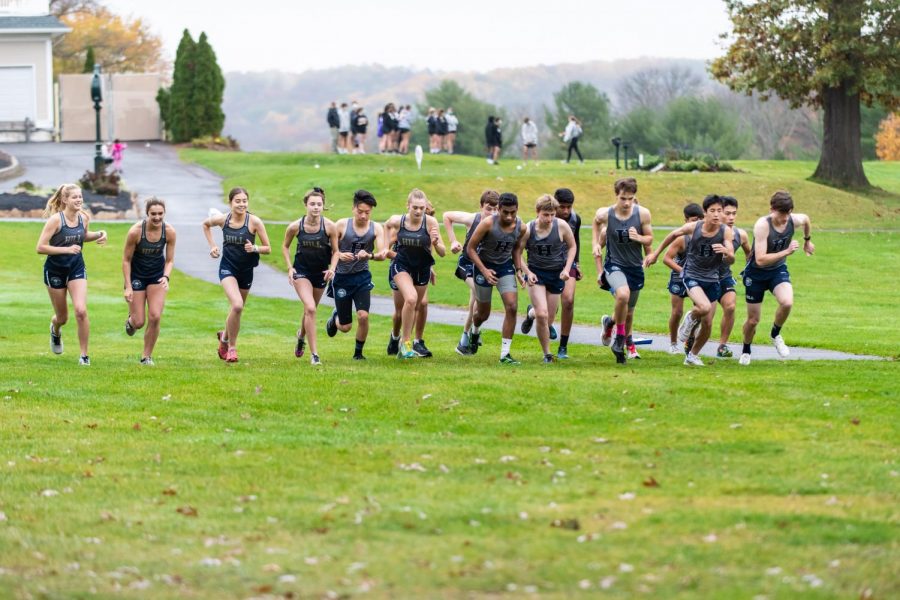Hill works to become more equitable for all student-athletes
Imagine it is the last game of the 2018 Lawrenceville weekend. Dating back to 1887, The Hill School and Lawrenceville have met to play against each other for one weekend in every fall sport. Now, a huge mass of people — half wearing Hill blue, the other half wearing Lawrenceville red — head over to the final game to see if their school will win the rivalry. The team that had the honor of playing in the very last event of the weekend that year might surprise you.
“Instead of football being the last game of the Lawrenceville day, football ended and the whole school came up under the lights for that MAPL field hockey championship game and were able to kind of rally around one of our female teams for the final game,” Seth Eilberg, director of athletics and co-curricular activities at Hill, said.
This year’s NCAA March Madness showed that not every tournament has successfully navigated how to equitably treat female athletes.
“Weight Rooms, care packages, food and child care have been called into question. The men’s teams are given an abundance of amenities while the women have been given the bare minimum,” Insider NU writer Lia Assimakopoulos stated in an article published on March 19.
The differences between how male and female athletes are treated at the collegiate level raises the question if male and female athletes are treated equally at The Hill School. Marcela Gaitan, associate director of athletics at Hill, said every athlete will have a unique experience depending on the sport they play.
“I think every sports opportunity, whether it is boys or girls or field hockey or ice hockey or fencing or crew, it’s very unique and hard to compare,” Gaitan said.
Ari De Santis ’22, who is on the girls varsity golf team, said that the boys and girls golf teams at Hill are given the same resources to succeed.
“For golf, we can use the country club basically whenever we feel like it; we have a mini driving range behind the baseball field, and we have a golf center in the athletics facility that has a golf simulator and a putting green,” De Santis said. “I can’t really think of anything else we could need.”
See below for Ari De Santis’s thoughts on equity for student-athletes within the community:
Although many Hill student-athletes agree they have been given the same resources to succeed, some feel as though they are not supported enough in the community.
“I feel like by the faculty I am supported as much as male athletes in the community, but I feel like in terms of students I’m not,” Hannah Gordon ’21, who is on the girls varsity ice hockey and softball teams, said.
See below for more of Hannah Gordon’s observations of how female athletes are treated at Hill:
Some male athletes have also noticed the inequalities between girls and boys sports within the Hill community.
“The success of teams is not valued enough,” Will Dollhopf ’21, who runs track, stated in a text. “Our girls hockey and field hockey teams have been fantastic recently, but football still seems to get more attention.”
This is not just a Hill School problem; it is a societal problem.
“The Hill School is a microcosm of society in many ways, as it relates to sports too. We see there are inequities among females in sports and males in sports,” Gaitan said.
The Hill School athletics department is dedicated to fixing the inequalities within the Hill community. They even started a task force on “gender excellence” three years ago for the student-athletes.
“We would really dive into it, whether it was recruiting or resources or equipment or if it was time of the game, we would go into it and try to understand if it was inequity or just what was happening,” Gatian said. “First we had a student focus group of girl athletes and boy athletes and we asked them similar questions, so like ‘what does your experience look like’ or ‘where do you feel like there are inequities’ to try and pick apart what could be.”
See below for more details about the gender excellence task force:
The gender excellence task force dove into not only inequities between boys and girls sports but also inequities among the different types of sports. Various coaches joined the task force.
“We had multiple genders, multiple sports, multiple seasons,” Gaitan said.
The Hill School has put a lot of thought into intentionally creating sports schedules so fans can support both boys and girls teams. One example is that field hockey game three years ago.
See below for Athletic Director Seth Eilberg’s thoughts on equity among athletes at Hill:
“I think we have made great strides,” Eilberg said. “I think any kid playing in that game would feel extremely supported and celebrated knowing they have the whole school out there rooting them on.”
























